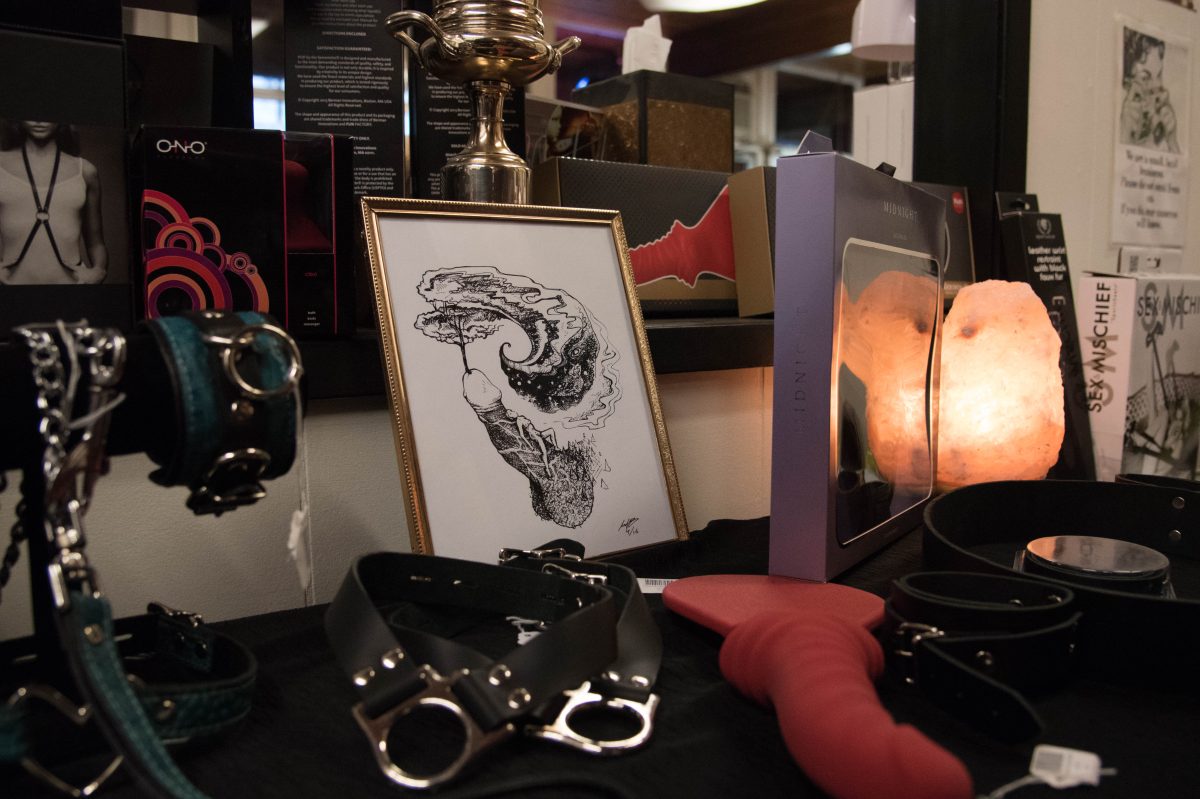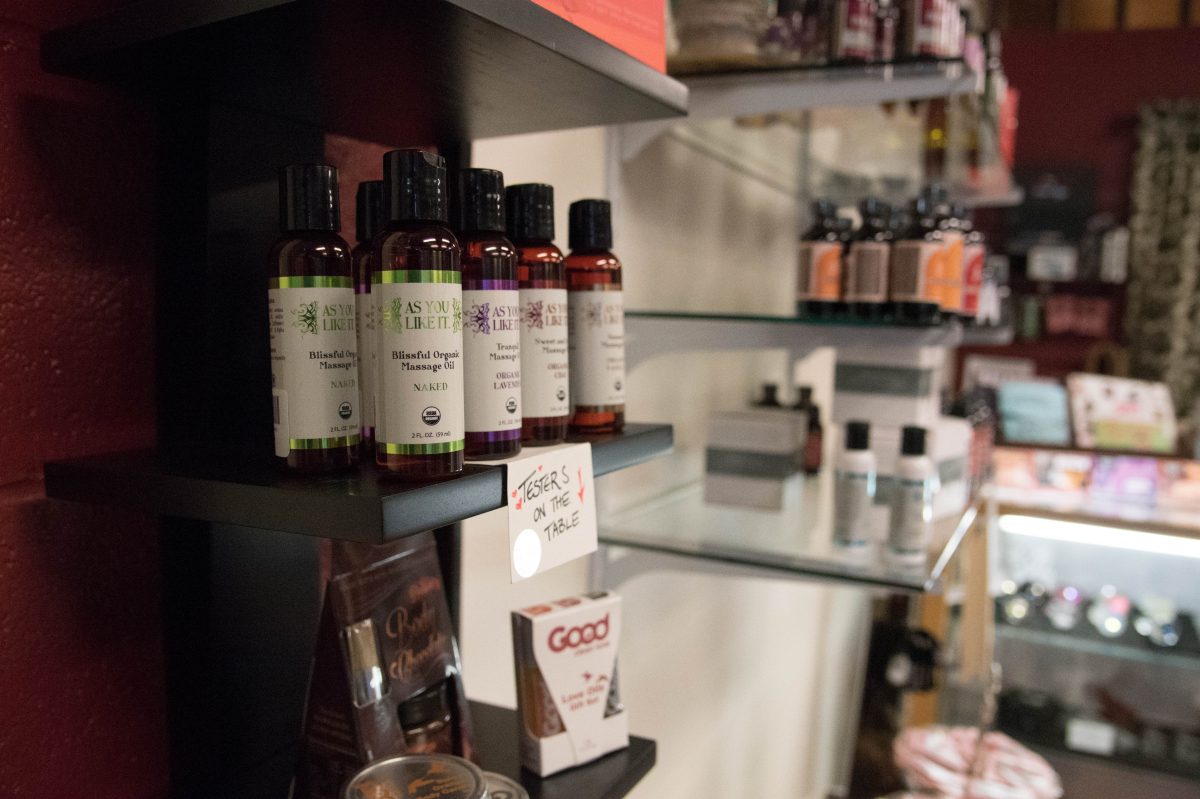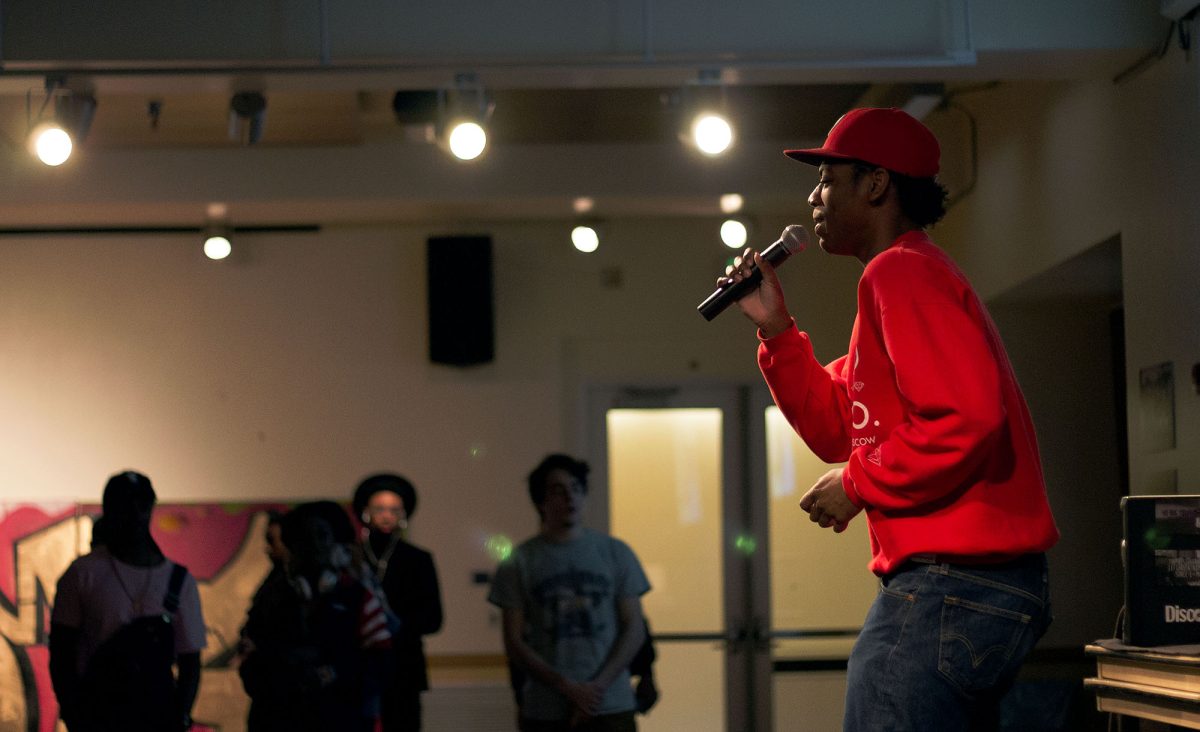Words by Sarah Hovet, Photos by Phillip Quinn
Trigger warning: This story contains material relating to sexual violence.
[dropcap]L[/dropcap]ike any adult store, As You Like It in Eugene, Oregon, carries body butter, leather, and libido enhancers. But at this adult store, the body butter is organic and local, the leather is either recycled or vegan, and the libido enhancers contain botanicals that would fit in on the shelves of Sundance Natural Foods. The store also contains a bookshop, featuring titles such as Women’s Anatomy of Arousal to Healing Sex: A Mind Body Approach and a coloring book that invites the reader to “Color My Boobs.”
“The effort to medicalize sex is insanity,” employee Jane Steckbeck says.
Steckbeck wears a small vibrator around her neck as she walks around the store shelves of genderplay-friendly lingerie and locally made sensation-play items from Spanky’s Toy Box. She is a part-time employee at As You Like It, a member of the board of Southwestern Planned Parenthood, and a certified sex coach. Kim Marks, owner of As You Like It, only hires sexual educators to work in the store. She hired Steckbeck in autumn of 2016.
Steckbeck gains joy by helping others find pleasure in sex. She tells the story of 60 sorority women renting the store for a private party. Each wrote a question they wanted to ask on a piece of paper, crumpled it into a ball, and threw it to the front of the room, at which point Steckbeck and Marks answered each question, which expressed concerns and curiosities from “Why can’t I orgasm when I’m on top?” to “How can I add kink to my relationship?” Some girls left the shop with matching vibrators. She talks about the Hot Octopus Pulse Two, a male vibrator the store carries which can be used with a cock ring to keep the penis erect without resorting to Viagra. She talks about an 80-year-old woman who visited the shop recently to find products that would help with her kegel exercises, so she could maintain her sexual activity. These are just a few of the situations Steckbeck often finds herself in at her job.
“Oftentimes what I end up doing as a sex coach is assuring people that they’re perfectly normal as they are.
For Steckbeck, sexual intimacy was revealed to her early, though not in the same way she understands it now. When Steckbeck was 9 years old, she was sexually assaulted when a teenage boy took her away from a neighborhood game of kick-the-can, and put his hand down her pants and fondled her. This was the first time. When she was 12, she visited an older boy, the son of family friends, to ask for a motorcycle ride, which she had done many time before. This time he called her into his bedroom, where he lay naked on the bed, and held her hand to his penis while he masturbated. When she was 15, a 21-year-old family friend asked her on a date and then threatened to kill himself if she left him, blackmailing her into a six-month sexual relationship. At the age of 18, a man date-raped her while she was unconscious. At 21, she was pressured into a partnership with her college professor who she felt powerless to say no to because she wanted to work on his research team.
“Cumulatively, this added up to a perception that sex was what other people wanted to do to me, whether I wanted it or not,” Steckbeck says.
For her, the path to rediscovering the joy and empowerment in sex began with an intimacy workshop like the ones she now leads. She had always known she had suffered abuse in the past, but, like many women who have faced this, she considered it something from which she had moved on. But she found herself pushing her husband away more and more often. So when he asked her to attend an intimacy workshop with him, she “felt like she had been handed a lifeline.”
She describes her healing process as gradual because she had to heal on five different levels of mind, body, emotion, energy, and spirit. When using the tools available to those in need of sexual healing, she engaged in somatic work. This practice involves mind-body healing, in which participants release stored memories from their muscles and tissues. This allows people to work past their triggers. “We might go into a room and see someone and disassociate because they look like our abuser.” This is an example of a visual trigger.
During this time, she attended a second workshop with her husband and engaged in an exercise aimed at helping men and women understand each other better. Men and women showed each other their genitals and talked about what it’s like to live in a man’s body and to live in a woman’s body.
“You take a confidentiality vow, so you don’t talk about workshop content because people who don’t do this work will get freaked out,” Steckbeck explains. “They’re very safely, expertly conducted. There’s zero sexual energy in the room.”
When it came time for Steckbeck and her husband to do the exercise, At first, she found herself poking fun at it. When she later felt as if she were floating outside her body, she opted out of the exercise. Then a flashback of the encounter with the neighbor hit her, and she knew she had to repeat the genitalia exercise. Months later, she signed up for the same workshop.
Her second time there, she approached a man lying nude, penis exposed. She fell to her knees and began sobbing. She could feel the other participants supporting her. “The value of learning to sit across from another human being and hear about their life story is humbling and grounding and connecting,” she says.
“It’s scary out there,” Steckbeck says of the current climate toward sex.
As You Like It sells products that contain medical-grade stainless silicon, stainless steel, and glass. But other sex shops sell products containing artificial flavors and dyes that contain known endocrine disruptors. “This industry gets away with a lot,” Marks says.
Growing up in the Bay area, Marks enjoyed the sex-positive pleasure shop Good Vibrations and found that lacking when she moved to the Pacific Northwest in 1994. She decided to start As You Like It after she was diagnosed with thyroid cancer in 2003 and refuses to sell anything carcinogenic.
“We should be as careful with our intimate products as we are with the food we eat,” says Marks. “If you’re putting something in your vagina, it’s equivalent to putting it in your mouth. It’s the same mucus membranes.”
Carcinogens are not the only scary things in today’s sex culture. Marks says the lack of education is alarming and sex ed needs to happen earlier in life. It needs to happen in retirement homes, where STIs are on the rise. It needs to happen so that young people know how to use a condom. But it needs to be more than fear-based, she says.
“You get an education in the store as well as shopping experience,” customer Sadie Dressekie says. She began shopping at As You Like It while it was still an online store. She attended a jealousy workshop there and found what she learned applicable to her everyday life. She explains the range of people in the shop on a given day can range from a mother with her 18-year-old daughter to seniors.
“It’s all about relationships,” she says.
Marks and Steckbeck have consolidated their educational resources into a Facebook page for the Eugene Intimate Health Center. This allows people to like the page and share from it without directly tying themselves to a sex toy shop.
Steckbeck is currently facilitating a series of workshops on intimacy after 50, with experience from teaching Planned Parenthood’s class for seniors “The Heart Has No Wrinkles,” and looking forward to publishing her memoir. Additionally, she is designing a seven-week webinar for women about reconnecting with their sexuality. On her website, a PhD candidate from Pacific University has blurbed, “I’ve never [before] heard anyone talk about past sexual trauma without at least some internalized victim-blaming. It was wonderful to hear someone tell her truth without any overlay of cultural shame.”
Steckbeck loves her work. “Oftentimes what I end up doing as a sex coach is assuring people that they’re perfectly normal as they are.”
Looking to provide a safe and versatile body lotion, As You Like It produces its own organic massage oil that can be applied virtually anywhere on the body without causing harm. Unlike many lubricants, As You Like It’s contain no artificial flavors and are cruelty-free.















